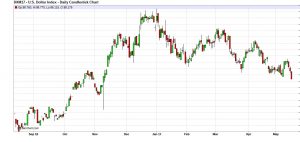Daily Comment (May 16, 2017)
by Bill O’Grady, Kaisa Stucke, and Thomas Wash
[Posted: 9:30 AM EDT] Another controversy…the Washington Post[1] reported late yesterday that President Trump revealed highly classified information to the Russian foreign minister and ambassador. Although not illegal (the president essentially can determine the distribution and classification of information), the decision to share the intelligence is potentially reckless. The sources of the information appear to be from deeply imbedded moles within ISIS and from a Middle East source. The decision to share the information will likely put these resources at risk; the WP story indicates that the president revealed the city controlled by ISIS that generated the information. U.S. intelligence agencies did not reveal this information with close allies so the action is troublesome. Although the official stance of the administration is that nothing was revealed, it is notable that Tom Bossert, the assistant to the president on homeland security and counterterrorism, soon placed calls to the CIA and NSA to warn them of the breech. If nothing was revealed, it seems odd that Bossert would have notified the two primary U.S. intelligence agencies of what occurred.
There are two issues that concern us about this report. First, if this turns out to be a serious mishandling of critical information, other nations will stop sharing intelligence with the U.S.[2] In fact, it is highly possible that U.S. intelligence agencies will be less open to sharing intelligence with the White House, fearing the security of the information. Second, it’s important to remember that while there is a lot of information the government “classifies,” there is some information that is much more important than others. In general, the “sources and methods” is often more important than the information itself. This may be one of those cases. The information seems to relate to the laptop ban on some international flights; it appears quite likely that some terrorist group has figured out how to put a bomb on a laptop that is difficult to detect. The fact that laptops haven’t been banned on U.S. flights suggests that either (a) TSA’s methods can screen these bombs, or (b) (the more likely scenario) the laptop bomb is so sophisticated that they can’t be mass produced and thus the terrorist group wants to create a greater sense of terror than attacking an international flight would probably bring. If the president’s actions inadvertently reveal a path to sources and methods, it would seem reckless.
Here is where this action may start to affect financial markets. Political events tend to be “tail” risks. In other words, they are the sort of things that are difficult to predict, and if predicted, are difficult to determine their market effects. At a minimum, a White House that seems unable to avoid constant controversy will eventually undermine market confidence. Financial markets have put a good deal of faith into this president; the sharp rally in equities and the dollar strength we have seen since his election are a testament to the hopes that this administration would cut taxes, boost infrastructure spending and lift growth. Instead, we are seeing precious political capital squandered in unnecessary errors that distract policymakers from moving on the agenda the markets expected. Perhaps the “canary in the cage” is the dollar.

The line on the chart shows the dollar index over the past nine months. We have placed a horizontal line from the election to now. The dollar has essentially given up all of the post-election gains even though the FOMC appears on a path to at least two, if not three, more rate hikes this year. If other markets begin to conclude that the administration isn’t going to get anything accomplished, we may see similar moves in other markets as well.
This doesn’t mean the White House can’t recover. However, the current path is raising the chances that this administration will be unable to formulate policy which will be disappointing to investors. At the same time, the economy is holding up, earnings are solid and rates remain manageable. There is nothing that signals an immediate problem for equities. Unfortunately, the political situation is becoming more of a headwind when investors were anticipating a tailwind. That could become problematic as the year continues.
In other news, the recent ransomware attacks appear to be tied to North Korean hackers. Although the clues are not conclusive, a number of cybersecurity officials suggest that there is evidence pointing to North Korea. Apparently, the WannaCry virus used tools that North Korean hackers used against other targets in the recent past. At the same time, it should be noted that although this code isn’t commonly used, it could have been copied by a criminal organization or another state with hopes of pinning it on the Hermit Kingdom as cover. Still, if the North Koreans were involved, it will tend to make it easier to put sanctions on them with wider support.
______________________________________
[1] https://www.washingtonpost.com/world/national-security/trump-revealed-highly-classified-information-to-russian-foreign-minister-and-ambassador/2017/05/15/530c172a-3960-11e7-9e48-c4f199710b69_story.html?utm_term=.f059dc318ad3
[2] Concerns over sharing intelligence have been rising since Trump was elected. http://www.haaretz.com/israel-news/1.764711


